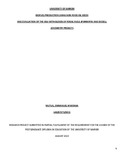| dc.description.abstract | Environmental pollution and diminishing supply of fossil fuels are the key factors leading to search for the
alternative sources of energy. Today, 86% of the world energy consumption and almost 100% of the energy
needed in the transportation sector is met by fossil fuels (Dorian et al., 2006). Since the world’s accessible oil
reservoirs are gradually depleting, it is important to develop suitable long-term strategies based on utilization
of renewable fuel that would gradually substitute the declining fossil fuel production. In addition, the
production and consumption of fossil fuels have caused the environmental damage by increasing the CO2
concentration in the atmosphere (Westermann et al., 2007).
Currently the most often-used type of biodiesel fuel is vegetable oil fatty acid methyl esters produced by
transesterification of high quality vegetable oil by methanol. Biodiesel derived from vegetable oil and animal
fats is being used in USA and Europe to reduce air pollution and dependency on fossil fuel. In USA and Europe,
their surplus edible oils like soybean oil, Sunflower oil and rapeseed oil are being used as feed stock for the
production of biodiesel (Ramadhs et al., 2004; Sarin and Sharma, 2007).Since more than 95% of the biodiesel
is synthesized from edible oil, there are many claims that a lot of problems may arise. By converting edible oils
into biodiesel, food resources are actually being converted into automotive fuels. It is believed that large-scale
production of biodiesel from edible oils may bring global imbalance to the food supply and demand market.
Recently, environmentalists have started to debate on the negative impact of biodiesel production from edible
oil (Butler, 2006). They claimed that the expansion of oil crop plantations for biodiesel production on a large
scale may increase deforestation in countries like Malaysia, Indonesia and Brazil. Furthermore, the line
between food and fuel economies is blurred as both of the fields are competing for the same oil resources. In
other words, biodiesel is competing limited land availability with food industry for plantation of oil crops.
Arable land that would otherwise have been used to grow food would instead be used to grow fuel
(Anonymous, 2004). In fact, this trend is already being observed in Kenya. There has been significant
expansion in the plantation of oil crops for biodiesel in the past few years in order to fulfil the continuous
increasing demand of biodiesel.Biofuels or liquid fuels are derived from plant materials. Their introduction into
the market was influenced by the oil spikes in prices noticed on fossil fuels and the increased carbon emissions
into the atmosphere depleting the ozone layer a phenomenon described as global warming.
The first generation biofuel introduced was bioethanol which is an alcohol made from fermenting sugar
components of plant materials for example sugarcane; other biofuels include biodiesel which were made from
vegetable oils and animal fats.
5
The global dilemma about biofuel production is that they rely mostly on plant materials which form the basic
human resource for food which keeps them in their optimum condition, these plants include; maize,
sugarcane and sunflower.
In this research we try to introduce nonfood oil seeds for biofuel production to ease the pressure on human
food oil seeds. It has been noted that some existing non food oil seeds have the capacity to act as biofuels
when blended with other biofuels like ethanol and paraffin. The aim of this research is to extract oil from this
seeds and determines their physiochemical capability to act as biofuels. | en |

